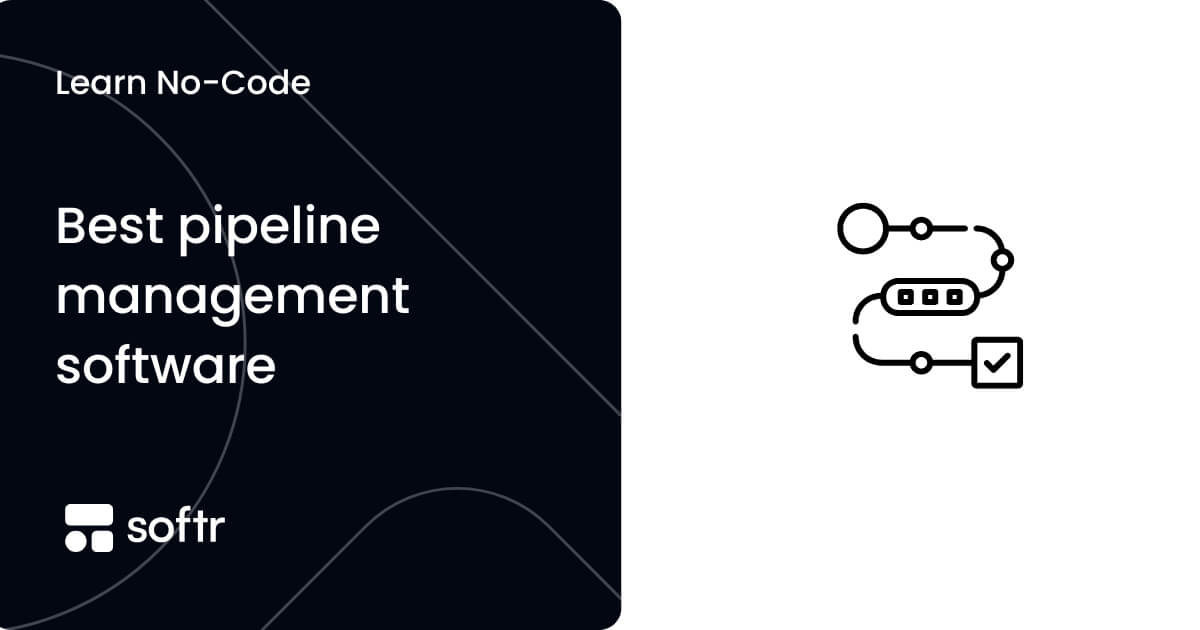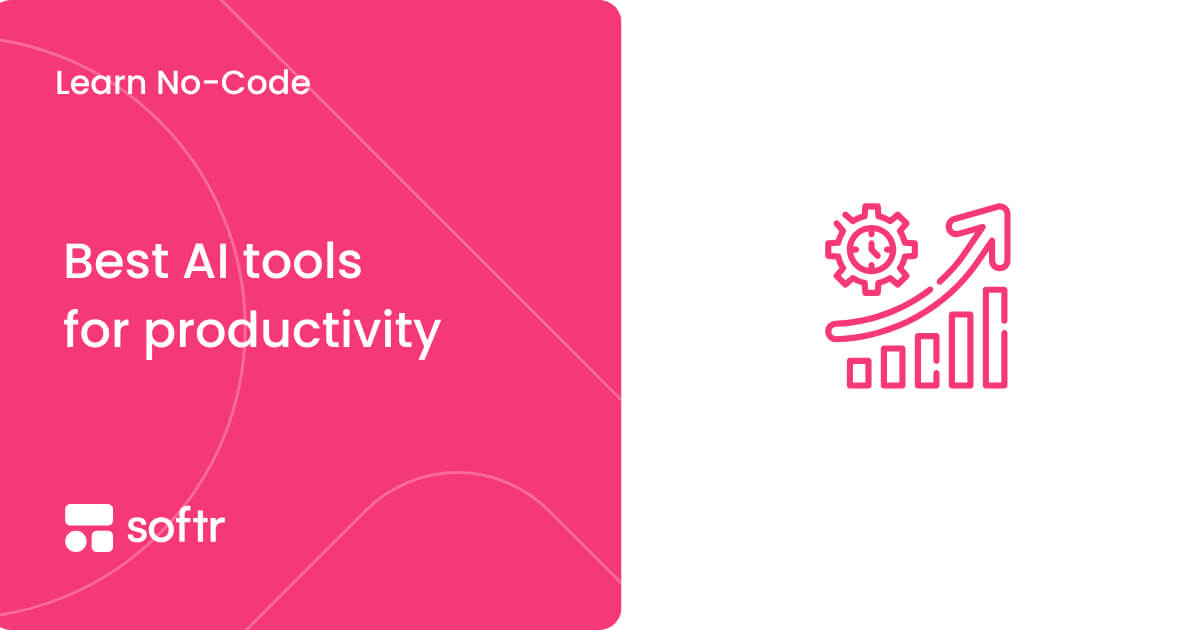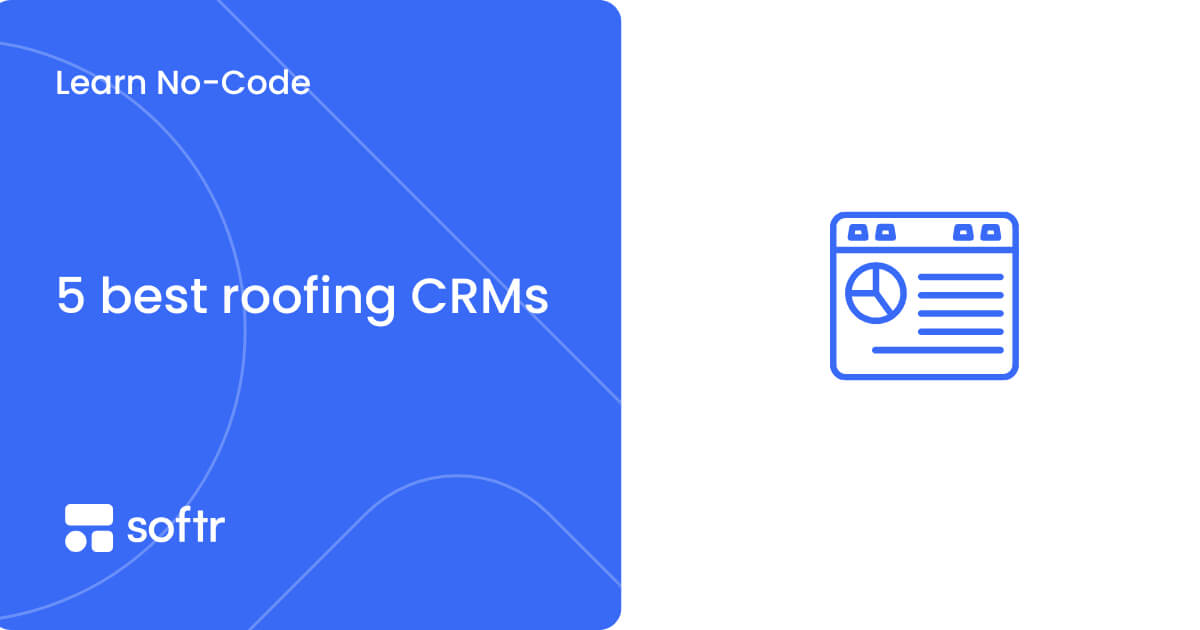The 7 best alternatives to Adalo for greater flexibility

Adalo is a modern no-code platform that lets users actively build dynamic mobile and web apps that work on both iOS and Android platforms. However, it has certain limitations and room for improvement.
Here are seven alternatives to Adalo:
Softr
Softr stands out as a no-code web app builder and is a rapidly emerging player in the spreadsheet-to-app landscape. It's designed for those who need flexibility without the technical intricacies.

Softr provides an intuitive interface with over 100 pre-built templates and blocks to ensure users get a polished end result. Comparable to Adalo, Softr is geared towards streamlining the app development process, focusing on rapid deployment and ease of use.
Softr apps are powered via integrations with powerful business tools like Airtable, Google Sheets, Zapier, Stripe, Mailchimp, and more. But the real edge Softr has over Adalo is its concentration on web app development.
While Adalo has recently introduced web app-building capabilities, it primarily revolves around native mobile apps. Likewise, you can easily convert Softr web apps into progressive web apps that are mobile-friendly and accessible from any device.
Both Adalo and Softr prioritize user experience, offering intuitive drag-and-drop interfaces that make the app development process easy and efficient. They both support responsive design, ensuring that apps and websites look polished across devices.
Both platforms provide a free tier, but Softr goes a step further with unlimited web app publishing and a complimentary custom domain. Adalo requires a paid tier for app store submissions and limits the number of apps you can publish. Softr's basic plan starts at $49/month, and the professional plan that lets you put your own branding is priced at $139/month.
While both support Stripe payments, Softr also includes PayPal and Gumroad, catering to a broader audience. Just like Adalo, Softr supports integration with third-party applications to improve the scope and capabilities of the apps created.
Both platforms promote real-time collaboration, allowing teams to work synchronously. And both tools provide an ecosystem for professional support in the form of an experts program. Vetted experts from around the world can be hired to build out your app on these platforms in cases where you need additional support.
When it comes to ease of use and learning curve, Softr is a notch above Adalo. While Adalo presents a canvas-based interface that requires a bit of orientation, Softr's block-based approach is instantly familiar, especially to those who have dabbled in modern web builders.
Softr presents itself as a compelling alternative to Adalo, especially for those looking to bridge the gap between web and app development without diving deep into code. If mobile app development with a tad more customization is your goal, Adalo could be your go-to. However, if you're looking for a web-focused, cost-effective, and user-friendly platform, Softr might be your match.
FlutterFlow
FlutterFlow is a relatively new no-code tool launched in 2020. If you're a designer, you'll find it particularly exciting, as it offers a similar experience to Webflow but specifically for mobile apps. FlutterFlow is built on Google's Flutter and lets you design and develop fully functional mobile apps that can be published on both the Apple Store and Google Play Store.

FlutterFlow constantly releases new features and improvements, positioning itself as one of the best no-code app builders for mobile apps. Much like Adalo, FlutterFlow provides tools and interfaces that simplify the journey from idea to app deployment.
While Adalo provides a generalized platform for both web and mobile app development, FlutterFlow leans into the strength of the Flutter framework, focusing primarily on mobile app development. This focus ensures that apps built with FlutterFlow can capitalize on the performance and customization benefits of Flutter, such as smooth animations and consistent behavior across platforms.
In terms of the customization of UI elements and animations, FlutterFlow certainly has an advantage. It allows developers to use custom widgets and pre-built animations that can make apps feel more premium and responsive.
Since the underlying code generated by FlutterFlow can be exported and edited by developers, it also offers a seamless transition from a no-code to a full-code environment if needed.
Both platforms offer templates and pre-designed elements to jumpstart the app development process. Additionally, FlutterFlow provides direct integrations with Firebase, allowing for robust backend capabilities such as real-time databases, cloud functions, and authentication.
FlutterFlow is priced at $30/month for the standard tier and goes up to $70/month for up to ten users. The basic plan is free and includes access to the platform's core features, as well as 100MB of storage and 5,000 API requests per month.
In the realm of community and support, FlutterFlow users benefit from both the platform's dedicated community and the larger Flutter ecosystem. This double-layered support can be invaluable for troubleshooting or getting inspiration.
When comparing the learning curve of FlutterFlow with Adalo, it's worth noting that while FlutterFlow is user-friendly, beginners might require a few weeks to fully grasp its functionalities. So, if you're aiming to launch an app quickly, consider Adalo instead or bring on board an expert with deeper domain knowledge.
For those looking to tap into the potential of Flutter without diving deep into code, FlutterFlow presents itself as a powerful contender. It combines the principles of no-code design with the power of a renowned framework, making it a great alternative to platforms like Adalo.
Thunkable
Thunkable has been around since 2015 and has cemented its place in the no-code app building space. It's inspired by the legacy of the MIT App Inventor and has positioned itself as a distinctive player in the no-code mobile app development arena.

Like Adalo, Thunkable has a drag-and-drop interface where your app project can be downloaded for Android and iOS devices and then exported to the Google Play and Apple App Store.
Both platforms allow for real-time testing, allowing you to see your app in action instantly on their devices. Both Adalo and Thunkable offer cloud-based platforms, ensuring that creators can work on their projects from anywhere.
They also have ready-to-use templates to jumpstart the process, along with a rich set of help docs to assist newcomers and provide troubleshooting support.
Thunkable is more beginner-friendly with its component-based approach. You can drag essential building blocks or components, such as buttons, lists, or media players, onto your workspace to build an app.
Another distinctive strength of Thunkable is its live testing feature. While Adalo provides a preview mode, Thunkable goes a step further with its companion apps for iOS and Android, allowing users to test their creations on their own devices in real-time. This immediate feedback loop can significantly speed up the design and testing process.
Additionally, Thunkable has an in-built translation feature, which can automatically translate the app's text content into multiple languages, a feature not natively available in Adalo.
Thunkable's personal starter plan is priced at a comfortable $13/month. However, apps cannot be published on this plan. The pro plan is the most likely choice for anyone looking to publish their app and is priced at $38/month.
Thunkable is a beginner-friendly alternative to Adalo with its component-based design approach and easy testing process.
Bubble
Bubble has been the gold standard of no-code mobile app builders—it was one of the first on the market and paved the way for the rest. While Adalo's speciality leans towards app development with a relatively straightforward interface, Bubble offers a deep dive into web application development, simulating the intricacies of traditional web app frameworks but in a visual way.

Bubble stands out for its flexibility and high customizability, empowering users to craft unique app experiences by designing their own workflows, actions, and integrations. This granularity offers more flexibility in creating data-driven applications compared to the more template-based data handling in Adalo.
While it's tailored primarily for web applications, it's worth noting that converting these into native iOS or Android apps for the App Store and Google Play might need some extra tools like plugins. However, users can efficiently manage this transition with the right resources.
Another notable feature of Bubble absent in Adalo is its robust scalability. With a well-structured database, it can accommodate up to 1 million users without a dip in performance.
For those willing to go beyond the in-built features, Bubble provides the option to incorporate JavaScript, HTML, and CSS. This means users can add new components, animate elements, or introduce features not inherently available on the platform.
While both platforms have nurtured supportive communities, Bubble's marketplace of templates and plugins is particularly vibrant. Users can not only choose from a growing set of pre-made templates but also leverage plugins to instantly augment their apps' functionalities.
In design terms, Bubble offers a canvas that leans heavily towards web application structures, complete with elements, workflows, and data tabs, making it an immersive experience for those wanting a deeper dive into the application-building process.
You can start using the platform with its free version or through its paid plans, which start from $25 per month. Without a doubt, Bubble is a more powerful app-building tool than Adalo, but as mentioned, it comes with a steeper learning curve.
For those building a more powerful, comprehensive no-code web application development experience, Bubble presents itself as a compelling Adalo alternative. With its depth, flexibility, and community-driven enhancements, Bubble is a formidable tool in the hands of those who learn to use it.
Glide
Glide has quickly gained attention as a new solution for creating applications directly from Google Sheets. Bridging the gap between spreadsheet data and app creation, Glide offers a way to build functional apps and lets you interact with your freshly created database without the use of any code.

Glide's unique selling point is its seamless integration with Google Sheets. Rather than having a built-in database system like Adalo's, Glide uses Google Sheets as its data backbone, meaning any updates to a spreadsheet in Google Sheets is reflected in the app instantaneously. This approach is particularly intuitive for those already familiar with spreadsheet tools.
Glide shines in rapid prototyping and deployment. While Adalo offers more complex app development features, Glide's strength lies in its simplicity and speed, making it especially suitable for projects that need to be up and running in no time.
Compared to Adalo, Glide offers a streamlined design approach, but this comes at the cost of full UI customization. Your app visuals can be customized far more efficiently on Adalo, making it much easier to build an app with a slick and unique interface.
Also, while Glide has a vast array of actions and triggers, diving into complex functionalities can be challenging and limited compared to Adalo. However, Glide still offers valuable features for real-time feedback through an easy desktop version of your app that you can use to see immediate changes.
If you need more advanced customization options, a business or enterprise plan provides features such as CSS, enabling further control over UI/UX components. But this approach might mean needing a Glide expert to get involved. Glide's Starter plan is priced at $25/month and the Pro plan at $99/month.
The community aspect is where Glide shines. The community has a genuine ethos of sharing and collaboration, and Glide community members freely share app templates and help each other work through hurdles.

For beginners, Glide University has top-notch beginner video tutorials. These videos guide you through the app's use and introduce foundational app-building concepts, accelerating your learning curve.
Among no-code tools, Glide is one of the easiest to grasp, making it perfect for newcomers looking for swift no-code solutions. If speed is your goal, Glide is your answer. But if a more complex or customizable app is your goal, Adalo is a preferred choice.
AppSheet
AppSheet has steadily made its mark in the no-code application development sector. AppSheet leverages data sources like Google Sheets, Excel, and even SQL databases to convert tabular data into functional apps.

While Adalo's strength lies in its visual interface and broad application utility, AppSheet champions the notion of transforming pre-existing data into dynamic apps without traditional coding barriers.
Both Adalo and AppSheet are user-friendly, intuitive platforms that allow real-time previews and let users witness and tweak the behavior of their apps on the fly. AppSheet's design is inherently data-centric. Instead of starting from scratch, you begin with your data, whether it's a spreadsheet or a database.
AppSheet then uses this data structure to suggest app layouts and functionalities. This is fundamentally different from Adalo's more holistic, design-first approach.
While Adalo provides a canvas for versatile app creation, AppSheet's real strength lies in its rapid application development from existing datasets. For instance, if an organization already maintains its inventory in Google Sheets, AppSheet can almost instantly generate a functional app out of it. Moreover, being under the Google Cloud umbrella, AppSheet natively integrates with various Google services, ensuring a seamless workflow.
AppSheet is a worthy comparison to Adalo because of its ability to interact with diverse data sources, from popular spreadsheet platforms to cloud databases like MySQL or SQL Server. This flexibility ensures businesses with existing data infrastructure can easily migrate to AppSheet.
Also, its offline capabilities stand out. AppSheet apps can function offline and sync data when online, which is especially handy for fieldwork or areas with sporadic internet connectivity.
Another aspect worth highlighting is AppSheet's machine learning integration, allowing more advanced functionalities like predictive modeling directly within the app, a feature not commonly found in many no-code platforms.
AppSheet doesn’t have a free plan, and the Starter plan costs $5/month/user. The Core plan is the most popular one, costing $10/month/user, as it lets you access automations and features needed to power your app.
If you need a data-driven, no-code app development platform, especially for businesses with pre-existing data infrastructure, AppSheet is a worthy Adalo alternative. With its focus on leveraging existing data sources, native Google integrations, and advanced features like machine learning, AppSheet is poised to turn raw data into interactive apps with unparalleled efficiency.
Appy Pie
Appy Pie, widely recognized for its "Make an app, as easy as pie" mantra, allows users to create mobile apps using templates and a drag-and-drop builder. But beyond mobile apps, Appy Pie lets you create websites, set up automated workflows (similar to IFTTT or Zapier), and even build chatbots.

Whereas Adalo banks on its canvas-driven, holistic app design interface, Appy Pie emphasizes swift, template-based creation across a spectrum of digital products.
Real-time preview features are central to both Adalo and Appy Pie, enabling users to visualize changes as they construct their applications. However, when it comes to rapid deployment across multiple digital fronts, Appy Pie stands out. Its extensive template library for different industries ensures that businesses can get a basic version of their app or website running in hours.
Adalo, while robust in features, leans towards a more involved, deliberate app crafting process. While Appy Pie offers diverse features, Adalo provides a more streamlined and user-friendly experience, making app development feel natural, even for beginners.
Appy Pie is unique because of its business automation capabilities. You can opt for integrations similar to Zapier, linking well-known business tools or delve into comprehensive workplace automation. However, this full-fledged automation demands some coding expertise and familiarity with process design. On the other hand, Adalo provides straightforward in-app automation through Zapier, which is less versatile than what Appy Pie offers.
Despite its strengths, Appy Pie is pricier than most alternatives to Adalo in this list. While their Starter plan seems reasonable at $16/month per app, it doesn't include key features like to-do lists and timesheets, which are standard or free in other tools.
Another area for improvement is their pricing tied to app downloads, not monthly active users. So, you could be charged for app uninstalls, which is problematic, considering nearly half of the apps get uninstalled within a month. This could potentially feel like money down the drain.
Overall, for those deciding between Adalo and Appy Pie for a seamless and efficient app-building journey, Adalo is often the preferred choice.








